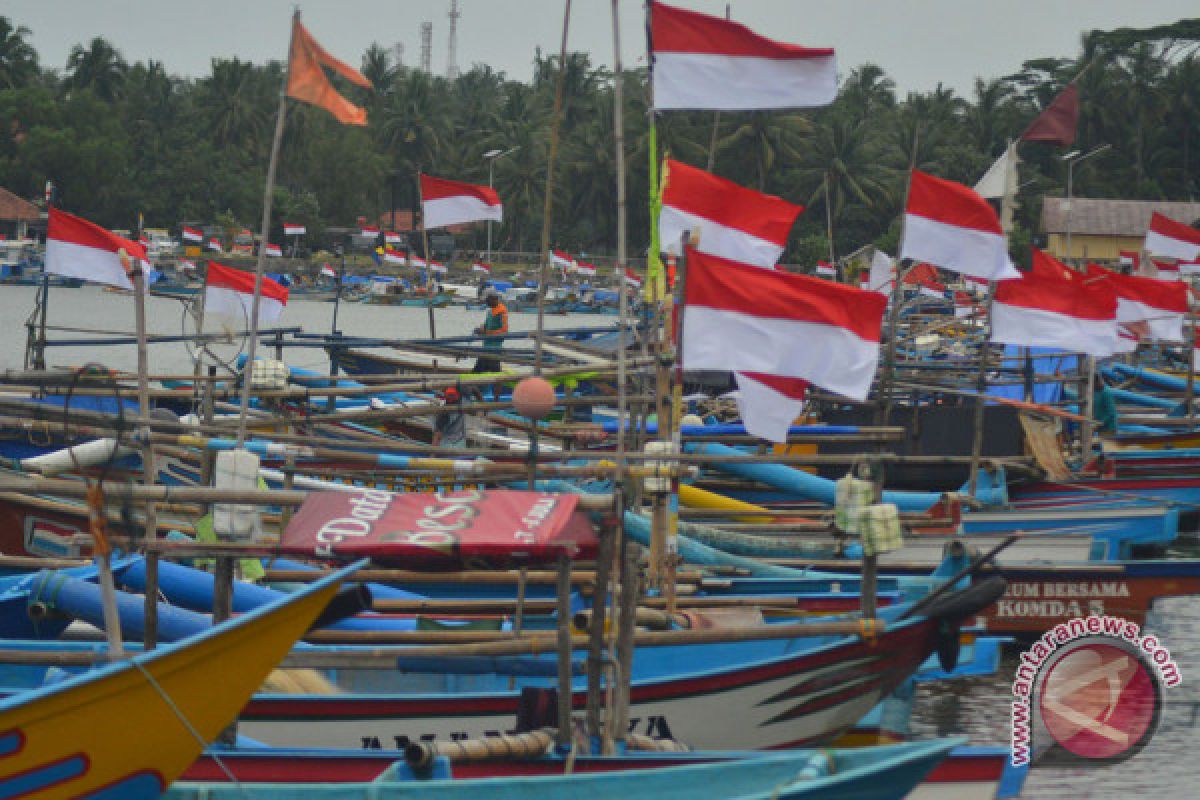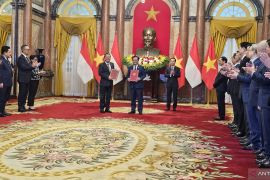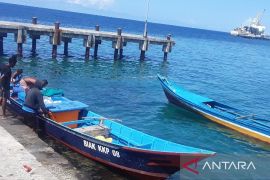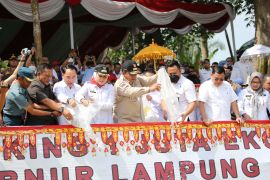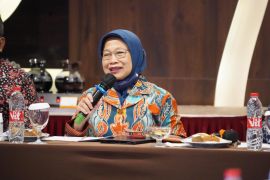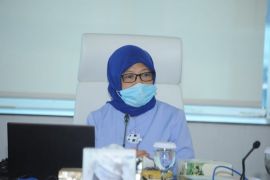"Our fisheries potential is extraordinary as now only Indonesia has abundant fish stocks," Maritime Affairs and Fisheries Minister Susi Pudjiastuti once stated at a fishery business and investment forum some time ago.
The optimal utilization of Indonesia`s vast marine areas and rich fisheries resources can earn the government trillions of rupiah in annual revenues. Its marine and fisheries resources have a revenue potential of up to Rp3000 trillion or about US$55.6 billion a year.
Such a potential fisheries resource should therefore be exploited in a sustainable manner so that it would not be depleted but remain available for the future generation.
The Ministry of Maritime Affairs and Fisheries is keen to build international awareness on the quality of Indonesian fishery products to expand its export market.
This is the reason why the `Our Ocean Conference (OOC) 2018` in Nusa Dua, Bali, took up the fisheries sector as one of its main focus apart from five other sectors, namely marine pollution, marine area protection, climate change, sustainable blue economy, and maritime security.
The hosting of Our Ocean Conference (OOC) 2018 which was held on October 29-30 demonstrated Indonesia`s commitment to facing and overcoming various challenges on ocean-related issues.
"Indonesia is committed to preserving our oceans and to enshrine its sustainability. In recent years, Indonesia`s maritime diplomacy has been more obvious and has become an integral part of Indonesian foreign policy complementing and enhancing our active diplomacy on peace and humanitarian issues at the regional and global levels," Indonesian Foreign Minister Retno Marsudi said at the opening of the conference on Monday (Oct 29).
In its efforts to exploit its fisheries resources in a sustainable manner, Indonesia also established cooperation during the conference, among others, with Norway and an institution that has cooperation with Australia.
Indonesian Foreign Minister Retno Marsudi and her Norwegian counterpart Ine Marie Eriksen Soreide agreed to sign a Letter of Intent on increasing cooperation in the maritime and fisheries sector.
The agreement to increase maritime affairs and fisheries cooperation was reached at an Indonesia and Norwegian Joint Commission Session. "I want to convey some information, the first being about our agreement to continue cooperation on maritime affairs and fisheries," Norwegian Foreign Minister Soreide noted
During the Indonesia-Norway Joint Commission Session, the two foreign ministers focused on discussing maritime and fisheries cooperation, particularly in combating illegal fishing. They also focused on building a sustainable marine economy.
Foreign Minister Soreide remarked that the Norwegian government paid great attention to maritime issues. Two-thirds of Norway`s export commodities came from marine and fisheries or coastal activities.
"Hence, for Norway and Indonesia, the sea is a life. We work together in responding to various issues related to marine affairs," noted the Norwegian minister.
In the meantime, Indonesia also established cooperation with an institution having link with Australia in the fisheries sector. Second Muse, a global collaboration and innovation institution in collaboration with the Australian Government Department of Foreign Affairs and Trade provides funding commitments for innovations that support sustainable fisheries in Indonesia.
Second Muse Indonesia director Simon Baldwin in Nusa Dua, Bali, Sunday night (Oct 28), said there were at least one million US dollars that could be used to support innovative startups and small to medium-sized businesses so they could develop with their innovations to support sustainable fisheries in Indonesia.
The Seafood Innovation Project (SIP) that has commitment to accelerate innovations, according to Baldwin, is the first in Indonesia. He hopes this will be a form of support to improve the sustainability of the aquaculture and fisheries sector throughout Indonesia.
"We have identified that there is a need to facilitate public-private partnerships in order to develop innovative solutions in the Indonesian fisheries sector," Baldwin said.
This program will be at the forefront of gathering cross-sectoral resources to foster innovation that has a major impact on the sustainability of fisheries in Indonesia to help safeguard these marine resources for the next generation.
Hoping to support sustainable fisheries, SIP tries to build an innovation ecosystem from stakeholders, companies, non-governmental organizations (NGOs), academia and government.
Besides cooperation with foreign partners, cooperation among institutions at home was also held such as that during the 2018 Trade Expo Indonesia (TEI).
This is done, for exaple, with Maritime Affairs and Fisheries Ministry, according to the Ministry`s Director General of Strengthening Maritime and Fishery Product Competitiveness, Rifky Efendi Hardijanto.
Hardijanto said one of the efforts to promote sustainable fisheries products was to establish cooperation with the Ministry of Trade and Ministry of Foreign Affairs by holding the TEI at the Indonesia Convention Exhibition - BSD City, Tangerang, Banten, on October 24-28, 2018.
"The target of transactions is not the main focus for us. Through this event, we build awareness of the quality of Indonesian fishery products among members of the international community," Hardijanto noted.
According to the director general, the TEI is an international-standard Indonesian export product exhibition with a B-to-B focus, held annually by the Ministry of Trade.
This year, however, it involved the Ministry of Maritime Affairs and Fisheries and the Ministry of Foreign Affairs.
"At this event, we provide products to be offered, and the Ministry of Foreign Affairs brings buyers from abroad with the potential to build cooperation," he noted. *
Reporter: Andi Abdussalam
Editor: Otniel Tamindael
Copyright © ANTARA 2018
